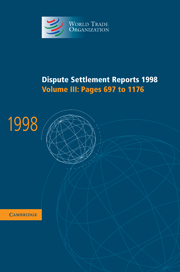Book contents
- Frontmatter
- Contents
- European Communities - Mesures Concerning Meat and Meat Products (Hormones), complaint by the United States (WT/DS26): Report of the Panel
- Argentina - Measures Affecting Imports of Footwear, Textiles, Apparel and Other Items (WT/DS56): Report of the Appellate Body
- Argentina - Measures Affecting Imports of Footwear, Textiles, Apparel and Other Items (WT/DS56): Report of the Panel
Argentina - Measures Affecting Imports of Footwear, Textiles, Apparel and Other Items (WT/DS56): Report of the Appellate Body
Published online by Cambridge University Press: 22 December 2017
- Frontmatter
- Contents
- European Communities - Mesures Concerning Meat and Meat Products (Hormones), complaint by the United States (WT/DS26): Report of the Panel
- Argentina - Measures Affecting Imports of Footwear, Textiles, Apparel and Other Items (WT/DS56): Report of the Appellate Body
- Argentina - Measures Affecting Imports of Footwear, Textiles, Apparel and Other Items (WT/DS56): Report of the Panel
Summary
INTRODUCTION: STATEMENT OF THE APPEAL
Argentina appeals from certain issues of law covered and legal interpretations developed in the Panel Report, Argentina - Measures Affecting Imports of Footwear, Textiles, Apparel and Other Items (the “Panel Report”). The Panel was established to consider a complaint by the United States against Argentina concerning certain measures maintained by Argentina affecting imports of textiles, apparel, footwear and other items, in particular, measures imposing specific duties on various textile, apparel or footwear items allegedly in excess of the bound rate of 35 per cent ad valorem provided in Argentina's Schedule LXIV and measures imposing a statistical tax of 3 per cent ad valorem on imports from all sources other than MERCOSUR countries. The relevant factual aspects of Argentina's import regime for textiles, apparel and footwear are described in the Panel Report, in particular, at paragraphs 2.1 to 2.21.
Argentina approved the results of the Uruguay Round of multilateral trade negotiations through Law No. 24.425, promulgated on 23 December 1994, and the bound rate of 35 per cent ad valorem included in its Schedule LXIV became effective on 1 January 1995. This binding was generally applicable to imports, with a number of exceptions that are not relevant in this case. In parallel, Argentina maintained a regime of Minimum Specific Import Duties (“DIEM”) as from 1993 in respect of textiles, clothing and footwear through a series of resolutions and decrees commencing with Resolution No. 811/93 of 29 July 1993 (concerning textiles and apparel) and Resolution No. 1696/93 of 28 December 1993 (concerning footwear), with subsequent extensions and modifications. The DIEM were revoked in respect of footwear on 14 February 1997 through Resolution No. 225/97 of the Argentine Ministry of Economy and Public Works and Services, and the Panel decided not to review the consistency with the WTO Agreement of the DIEM with respect to footwear. In addition, Argentina imposed, from 1989 to 1994, a 3 per cent ad valorem tax which related to the collection of statistical information by the Argentine customs service regarding imports and exports. Through Presidential Decree No. 2277/94 adopted on 23 December 1994, the tax was reduced to zero per cent, but was set again at 3 per cent on 22 March 1995 pursuant to Presidential Decree No. 389/95 in respect of certain import transactions.
- Type
- Chapter
- Information
- Dispute Settlement Reports 1998 , pp. 1003 - 1032Publisher: Cambridge University PressPrint publication year: 2000
- 1
- Cited by



